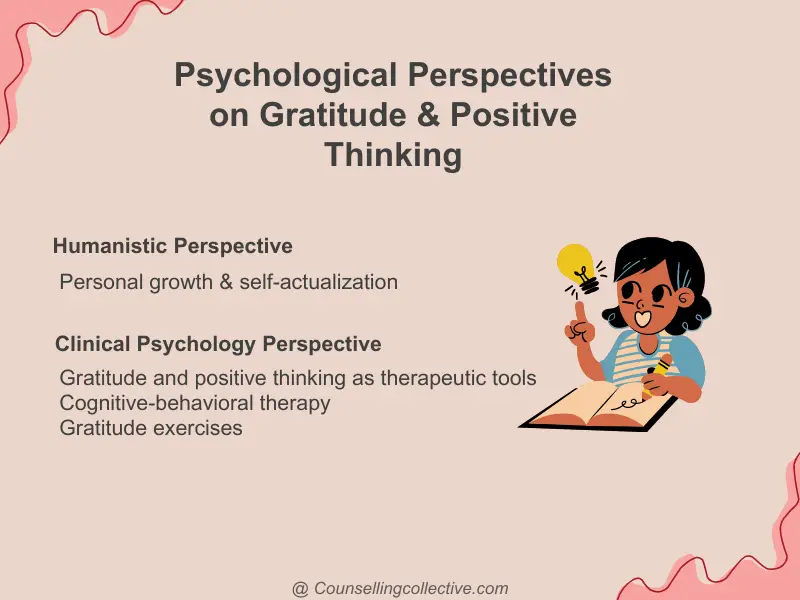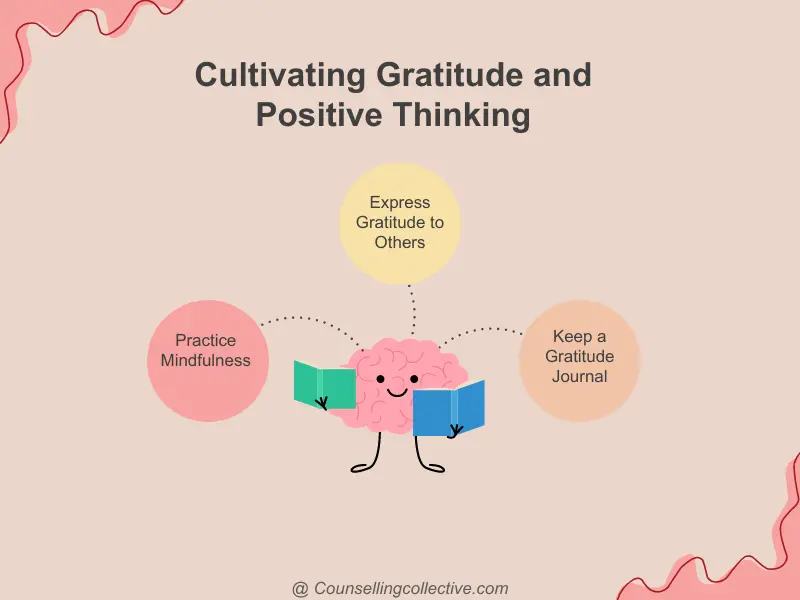Contents
Introduction
In the fast-paced and often stressful world we live in, cultivating gratitude and positive thinking can significantly enhance our well-being. These practices are more than just feel-good concepts; they have been scientifically proven to improve mental and physical health.
This article discusses the benefits of gratitude and positive thinking, their effects on the body and mind, various psychological perspectives on these practices, and practical ways to incorporate them into daily life, with relatable examples to illustrate their impact.

What is Gratitude?
Gratitude is a profound sense of appreciation and thankfulness for the positive aspects of life. It involves recognizing and acknowledging the goodness in one’s life, often attributed to external sources such as people, nature, or a higher power.
Moreover, gratitude can transform one’s outlook on life by encouraging a sense of contentment and resilience. It promotes mindfulness and encourages individuals to savor the present moment, thereby reducing negative emotions such as envy and resentment.
By regularly reflecting on the things they are grateful for, people can cultivate a more positive and fulfilling life, fostering a deeper connection with themselves and others.
The Science Behind Gratitude
Research has shown that gratitude can lead to numerous psychological benefits. It enhances well-being, increases happiness, and reduces depression and anxiety (Emmons & McCullough, 2003).
Neuroimaging studies have found that practicing gratitude activates brain regions associated with dopamine production, which is responsible for feelings of pleasure and reward (Zahn et al., 2009).
By incorporating gratitude into daily routines, such as keeping a gratitude journal or sharing thankful thoughts with loved ones, individuals can enhance their emotional resilience, build stronger relationships, and lead a more meaningful and joyful life.
Example: Anum’s Gratitude Journal
Anum, a high-stress corporate lawyer, started keeping a gratitude journal. Every night before bed, she wrote down three things she was grateful for that day. As she continued this practice, her unseen and unheard parts found a voice and the chaos in her stress settled as she wrote down her thoughts and feelings onto paper.
Over time, Anum noticed that she felt happier and more content. Her relationships improved as she became more appreciative of her colleagues and family members.
Affect of Gratitude on the Body and Mind
| Aspect | Impact of Gratitude |
| Mental Health | Reduces symptoms of depression and anxiety. It promotes positive emotions. It enhances the overall mood. |
| Physical Health | Lowers stress levels, benefits cardiovascular health and immune function, encourages healthier lifestyle choices such as regular exercise and better sleep patterns. |
| Brain Function | Stimulates the release of dopamine and serotonin, leading to greater resilience against negative emotions. |
| Social Connections | Fosters stronger relationships and social bonds, promotes prosocial behavior, empathy, and reduces feelings of loneliness |
Positive Thinking
Positive thinking is a mental and emotional attitude that focuses on the bright side of life and expects positive outcomes. It involves maintaining an optimistic outlook, even in challenging situations, and emphasizing constructive thoughts over negative ones.
This approach encourages individuals to view setbacks as temporary and surmountable, fostering resilience and a proactive mindset.
Positive thinking has been linked to numerous health benefits. It can reduce stress, improve cardiovascular health, and enhance immune function (Seligman, 2006). Studies have shown that positive thinkers have lower levels of distress and are better able to cope with adversity (Carver et al., 2010).
The Importance of Positive Thinking in Daily Life
By focusing on the positive aspects of life, people can maintain better relationships, improve problem-solving skills, and increase their overall productivity and motivation. This optimistic outlook also contributes to better cardiovascular health and a stronger immune system, promoting longevity and overall vitality.
Incorporating positive thinking into daily routines can transform one’s quality of life, promoting happiness, health, and a sense of accomplishment.
Example: Ajay’s Optimistic Outlook
Ajay, a small business owner, faced numerous challenges during an economic downturn. Instead of succumbing to despair, he maintained a positive outlook, focusing on potential opportunities rather than obstacles. This mindset helped him innovate and eventually grow his business, while many of his competitors struggled.
7 Benefits Of Positive Thinking
Positive thinking is more than just a slogan, it’s a powerful tool that can significantly enhance your overall well-being. It’s about approaching life with optimism, even in the face of challenges.
These are some benefits of Positive thinking;
- Improved Mental Health: It can reduce stress levels, increase resilience, and improve overall mental well-being.
- Enhanced Resilience: Positive thinking helps individuals bounce back from setbacks and challenges more effectively.
- Better Physical Health: Studies suggest that positive thinking can lead to better cardiovascular health, lower rates of depression, and even a longer lifespan.
- Increased Productivity: Optimistic individuals tend to be more productive and motivated, which can lead to greater success in personal and professional endeavors.

5. Stronger Relationships: Positive thinking fosters better interpersonal relationships by promoting empathy, understanding, and effective communication.
6. Improved Problem-Solving Skills: Optimistic people are more likely to approach problems with a proactive mindset, seeking solutions rather than dwelling on obstacles.
7. Enhanced Creativity: Positive emotions broaden our thinking and allow us to see more possibilities, which can lead to more creative thinking and innovative ideas.
The Effect of Positive Thinking on the Body and Mind
| Aspect | Effect |
| Physical Health | Decreased stress levels lower rates of depression Enhanced resilience |
| Mental Health | Decreased stress levels Lower rates of depression Enhanced resilience |
| Brain Function | Improved problem-solving skills Enhanced creativity and better decision-making abilities. |
| Social Connections | Stronger relationships increased social support greater empathy and communication. |
Psychological Perspectives on Gratitude and Positive Thinking
Humanistic perspective
The humanistic perspective emphasizes personal growth and self-actualization. According to Carl Rogers, a pioneer of humanistic psychology, gratitude, and positive thinking are essential for achieving self-actualization and fulfilling one’s potential. Rogers believed that individuals have an inherent tendency towards growth and that fostering positive emotions, such as gratitude, can facilitate this process (Rogers, 1961).
Clinical Psychology Perspective
In clinical psychology, gratitude and positive thinking are often used as therapeutic tools to improve mental health. Techniques such as cognitive-behavioral therapy (CBT) incorporate positive thinking to challenge and reframe negative thoughts. This approach helps individuals develop healthier thought patterns and reduce symptoms of depression and anxiety. Additionally, gratitude exercises, such as keeping a gratitude journal, are commonly used to enhance well-being and resilience (Beck, 1976).

Cultivating Gratitude and Positive Thinking
- Keep a Gratitude Journal: Write down three things you are grateful for each day. This practice can help shift focus from negative to positive aspects of life.
- Express Gratitude to Others: Take time to thank people who have made a difference in your life. Writing a thank-you note or expressing appreciation in person can strengthen relationships and enhance your sense of connection.
- Practice Mindfulness: Mindfulness meditation can help cultivate gratitude by encouraging you to be present and appreciate the moment. Focus on your breath, sensations, and surroundings to foster a sense of gratitude.

Practical Tips for Cultivating Positive Thinking
- Reframe Negative Thoughts: Challenge and reframe negative thoughts by focusing on positive aspects and potential solutions. This cognitive restructuring can help shift your perspective.
- Surround Yourself with Positive People: Spend time with people who uplift and encourage you. Positive social interactions can enhance your mood and outlook on life.
- Set Realistic Goals: Break down large goals into smaller, achievable steps. Celebrating small victories can boost your confidence and reinforce positive thinking.
- Practice Self-Compassion: Treat yourself with kindness and understanding, especially during difficult times. Self-compassion can help you maintain a positive outlook and reduce self-criticism.
Discovering the Best Mental Health Professionals for You
For finding local therapists and learning about mental health services. We connect you with professionals who provide personalized support tailored to your needs. Explore various therapy modalities, mental health conditions, and self-care strategies. Our mission is to empower you with the information to make informed decisions about your mental health care. Join us to connect with therapists dedicated to helping you live a happier, healthier life.
Conclusion
Cultivating gratitude and positive thinking can significantly enhance your well-being, improving both mental and physical health. These practices help shift your focus from negativity to positivity, fostering a mindset of appreciation and optimism. By integrating gratitude and positive thinking into your daily routine, you can experience reduced stress, increased happiness, and stronger relationships. Whether through keeping a gratitude journal, practicing mindfulness, or surrounding yourself with positive influences, these simple yet powerful strategies can lead to a more fulfilling and joyful life.
References
[1] Beck, A. T. (1976). Cognitive therapy and emotional disorders. International Universities Press. Amazon
[2] Carver, C. S., Scheier, M. F., & Segerstrom, S. C. (2010). Optimism. Clinical Psychology Review, 30(7), 879-889. Amazon
[3] Emmons, R. A., & McCullough, M. E. (2003). Counting blessings versus burdens: An experimental investigation of gratitude and subjective well-being in daily life. Journal of Personality and Social Psychology, 84(2), 377-389. Amazon
[4] Freud, S. (1936). The ego and the id. Hogarth Press. Amazon
[5] Kabat-Zinn, J. (1990). Full Catastrophe Living: Using the Wisdom of Your Body and Mind to Face Stress, Pain, and Illness. Delta. Amazon
[6] Rogers, C. (1961). On becoming a person: A therapist’s view of psychotherapy. Houghton Mifflin. Amazon
[7] Seligman, M. E. P. (2006). Learned Optimism: How to Change Your Mind and Your Life. Vintage. Amazon
[8] Zahn, R., Garrido, G., Moll, J., & Grafman, J. (2009). Individual differences in posterior cortical volume correlate with proneness to pride and gratitude. Social Cognitive and Affective Neuroscience, 4(4), 317-323. Amazon
